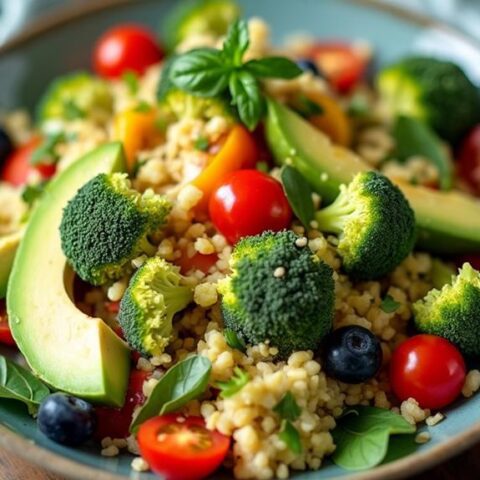
For a ketogenic diet, protein intake should range from 1.2 to 2.0 grams per kilogram of body weight, based on individual activity and health goals. Active individuals might require up to 1.6 grams per kilogram, while overweight persons should use their target weight for calculations. Protein typically makes up 20-30% of caloric intake, distributed evenly across meals to optimize muscle protein synthesis. Quality protein sources include lean meats, eggs, and certain dairy products. Balancing protein intake is essential to sustaining ketone levels and muscle preservation while preventing excessive gluconeogenesis. More insights on optimizing your keto diet await.
Key Takeaways
- Recommended protein intake on keto is 1.2 to 2.0 grams per kilogram of body weight.
- Active individuals should aim for around 1.6 grams per kilogram of body weight.
- Protein should constitute 20-30% of total caloric intake for weight maintenance.
- Distribute protein intake evenly across meals to maximize muscle protein synthesis.
- Excessive protein (>75 grams in a 2,000-calorie diet) may inhibit ketosis via gluconeogenesis.
Understanding Protein Needs
Understanding protein needs is vital for optimizing health and performance on a ketogenic diet. Protein timing and protein quality are significant factors to take into account. On a ketogenic diet, the recommended protein intake typically ranges from 1.2 to 2.0 grams per kilogram of body weight, adjusted for individual activity levels and goals.
Active individuals not in a calorie deficit should target around 1.6 grams per kilogram to maintain muscle mass during weight loss. It's also important to take into account that overweight individuals should base their protein needs on their target weight for effective fat loss.
To maximize muscle protein synthesis, it is important to distribute protein intake evenly across meals. Aim for 15-25 grams of high-quality protein per meal. This approach guarantees that muscle protein synthesis is stimulated multiple times throughout the day, which is particularly beneficial for active individuals and older adults who may need higher protein intake, around 1.2 grams per kilogram, to counteract age-related muscle loss.
It's vital to avoid excessive protein intake, as consuming more than 75 grams of protein in a 2,000-calorie diet may inhibit ketosis through gluconeogenesis. High-quality protein sources, such as lean meats, fish, eggs, and dairy, should be prioritized to meet nutritional needs without compromising ketosis.
Calculating Your Protein Intake
Calculating your protein intake on a ketogenic diet is an essential step to guarantee that you meet your nutritional goals while maintaining ketosis. To determine your protein needs, aim for 1.2 to 2.0 grams of protein per kilogram of body weight, adjusting based on your activity levels and specific health goals.
It is important to regularly review your macro targets to confirm they align with your goals. For those maintaining weight, protein typically constitutes 20-30% of total caloric intake. Conversely, if your objective is weight loss, a higher protein intake can be beneficial due to its role in promoting satiety and preserving lean muscle mass.
For overweight individuals, it is advisable to use your target weight rather than your current weight to avoid excess protein consumption, which could jeopardize ketosis.
An effective approach to protein timing involves distributing protein evenly throughout the day, ideally consuming 15-25 grams per meal. This distribution can enhance muscle protein synthesis and support overall satiety, vital factors in a ketogenic diet.
Monitoring your protein intake using tools like macro calculators can simplify the tracking process and help confirm you are meeting your dietary needs effectively.
Protein Sources on Keto
Selecting high-quality protein sources is essential for maintaining nutritional balance on a keto diet. Meats like beef, pork, and chicken, along with eggs and specific dairy products such as Greek yogurt and cottage cheese, provide substantial protein without compromising ketosis.
For sustainable protein choices, incorporating nuts and seeds in moderation can enhance dietary variety while ensuring adequate protein intake.
Additionally, seafood like shrimp and salmon offers nutrient-rich, low-carb options ideal for keto dieters.
High-Quality Protein Options
Achieving ideal nutrition on a keto diet requires the inclusion of high-quality protein sources that support muscle maintenance and overall health while adhering to carbohydrate restrictions. The protein quality of these sources is crucial, as they must provide essential amino acids efficiently.
Grass-fed meats, poultry, and fatty fish such as salmon and mackerel are excellent animal-based options, offering high biological value proteins with minimal carbs. Eggs and full-fat dairy products like cheese and Greek yogurt also fit well within keto guidelines, contributing significant nutrients without compromising ketosis.
For those seeking plant-based protein options, tofu, tempeh, and edamame can be integrated, though careful monitoring of their carbohydrate content is important. Nuts and seeds, including almonds, chia seeds, and pumpkin seeds, offer additional protein and healthy fats but should be consumed in moderation due to their calorie density.
Protein timing is also a factor; spreading protein intake throughout the day can enhance muscle protein synthesis and satiety.
Protein powders derived from whey, casein, or plant-based sources provide a convenient means to meet daily protein needs without increasing carbohydrate intake. Prioritizing minimally processed, additive-free proteins guarantees nutritional adequacy and supports maintaining ketosis effectively.
Sustainable Protein Choices**
Building on the foundation of high-quality protein options, choosing sustainable protein sources on a keto diet is an important aspect of long-term health and environmental stewardship. Sustainable farming practices guarantee that high-quality animal sources, such as grass-fed meats, poultry, and seafood, are produced with minimal environmental impact and ethical sourcing standards. These proteins provide the essential amino acids necessary for muscle repair and growth.
Eggs, a versatile protein option, offer about 6 grams of protein each while being low in carbohydrates, making them suitable for a keto diet. Additionally, dairy products like Greek yogurt and cottage cheese, which contain approximately 20-25 grams of protein per serving, can be included in moderation.
Plant-based proteins, such as tofu and tempeh, are viable options but require monitoring for carbohydrate content to fit within daily limits. Nuts and seeds, though nutrient-dense and protein-rich, should be consumed in moderation due to their higher calorie density, necessitating careful portion control for effective weight management.
Incorporating these sustainable, ethically sourced protein choices not only aligns with keto dietary goals but also supports a more environmentally responsible and health-conscious lifestyle.
Gluconeogenesis and Ketosis
Gluconeogenesis, the conversion of amino acids into glucose, is a critical metabolic function that supports non-ketone dependent tissues even during ketosis.
Adequate protein intake is essential on a ketogenic diet to guarantee sufficient glucose production without disrupting ketosis, as the body efficiently manages this process.
Excessive protein intake can lead to gluconeogenesis, where protein is converted into glucose.
Balancing protein intake is key to maintaining blood ketone levels of 1-3 mmol/L, thereby sustaining the metabolic benefits of ketosis.
Protein's Role Explained
Understanding the role of protein in a ketogenic diet is fundamental for optimizing health outcomes and maintaining ketosis. One considerable aspect is gluconeogenesis, a metabolic process where amino acids from protein are converted into glucose. This process is essential for sustaining blood sugar levels and fueling non-ketone dependent tissues.
However, concerns about protein disrupting ketosis are largely unfounded. Moderate protein intake, typically 1.2-2.0 g/kg of body weight, supports muscle preservation without greatly affecting ketone production.
Adequate protein helps mitigate muscle loss during weight loss phases, making it imperative for individuals aiming to maintain lean body mass. Evidence suggests that moderate protein consumption does not raise blood glucose enough to hinder ketosis in most people.
Additionally, protein timing can play a role in optimizing muscle preservation and maintaining metabolic balance.
- Gluconeogenesis supports blood glucose levels without disrupting ketosis.
- Moderate protein intake aids in muscle preservation.
- Typical protein range on keto: 1.2-2.0 g/kg body weight.
- Protein timing can enhance muscle retention.
- Optimal ketone levels (1-3 mmol/L) are maintained with balanced protein.
Understanding these nuances allows for a patient-centered approach to the ketogenic diet, ensuring nutrient needs are met without compromising ketosis.
Balancing Protein Intake
Balancing protein intake on a ketogenic diet is vital for guaranteeing that gluconeogenesis does not compromise ketosis while still providing the necessary amino acids for bodily functions. Maintaining a protein intake between 1.2 to 2.0 grams per kilogram of body weight is generally recommended. This range supports muscle preservation and facilitates ketosis by keeping gluconeogenesis—a process where protein is converted to glucose—at minimal levels that do not markedly disrupt ketosis.
Consuming around 20-30% of total daily calories from protein guarantees that gluconeogenesis does not interfere with ketosis, while still supplying adequate amino acids. It's important to understand that high protein intake does not automatically lead to excessive gluconeogenesis; rather, the body meets its glucose needs through natural processes within the context of a ketogenic diet.
For individuals engaged in resistance training or higher activity levels, protein intakes of up to 2.0 grams per kilogram of body weight can support muscle recovery without negatively impacting ketosis.
Attention to protein timing and protein distribution across meals can further optimize muscle synthesis and metabolic stability. This approach guarantees both the success of the ketogenic diet and the maintenance of overall health.
Protein Intake for Active Individuals

For active individuals adhering to a ketogenic diet, maintaining an appropriate protein intake is crucial to support muscle maintenance and recovery. Typically, this demographic requires between 1.6 to 3.0 grams of protein per kilogram of body weight.
For those not in a caloric deficit, a lower end of this range, around 1.6 grams per kilogram, is sufficient to preserve lean muscle mass and enhance performance. Research shows that the keto diet can improve fat oxidation, making protein intake even more essential for supporting muscle function.
Strategically distributing protein intake throughout the day, known as protein timing, is important. Consuming 15-25 grams of high-quality protein per meal maximizes muscle protein synthesis and guarantees continuous muscle repair.
Resistance training and high-intensity workouts enhance fat loss while preserving muscle, making adequate protein intake crucial.
- Resistance Training: Helps maintain muscle mass while burning fat.
- High-Quality Protein Sources: Such as lean meats, fish, and eggs, are essential.
- Even Protein Distribution: 15-25 grams per meal for enhanced muscle synthesis.
- Increased Protein for Diabetics: Around 30% of total calories can improve glucose control.
- Personalized Protein Needs: Based on body weight and activity level.
Active individuals, especially those with Type 2 diabetes, may need to tailor their protein intake to about 30% of total calories to improve glucose control and support muscle function.
Common Mistakes to Avoid
Maneuvering a ketogenic diet requires careful attention to avoid common pitfalls that can derail progress and affect health outcomes. A prevalent keto misconception is that higher protein intake is always beneficial. Consuming excessive protein, over 1.2-2.0 g/kg of body weight, can trigger gluconeogenesis, elevating blood sugar levels and hindering ketosis. This protein myth can easily mislead individuals aiming for muscle gain or satiety.
It's also important to be aware of nutrient deficiencies that may arise due to dietary restrictions, necessitating a balanced approach to food choices.
Another common mistake is neglecting electrolyte balance. Inadequate sodium and potassium intake may lead to dehydration and the onset of "keto flu" symptoms, underscoring the importance of maintaining proper hydration and mineral balance.
Additionally, not all high-protein foods align with keto principles. Breaded meats and sugary sauces often contain hidden carbohydrates that disrupt ketosis. It's essential to scrutinize food labels to avoid these hidden carbs.
Overconsumption of carbohydrates is another frequent error. Exceeding the recommended daily limit of 50 grams can prevent the body from achieving or maintaining ketosis.
Lastly, failing to adjust fat intake to constitute 70-80% of total caloric intake can result in insufficient energy levels, as the ketogenic diet depends on fat as its primary fuel source.
Addressing these common mistakes can greatly enhance the effectiveness and sustainability of a ketogenic diet.
Frequently Asked Questions
Is 100 Grams of Protein Too Much on Keto?
Consuming 100 grams of protein on keto may be appropriate depending on activity levels and goals. Focus on high-quality protein sources and consider protein timing to optimize muscle maintenance while monitoring individual responses to maintain ketosis effectively.
How Many Grams of Protein Should I Eat on Keto?
The recommended protein intake on a ketogenic diet ranges from 1.2 to 2.0 grams per kilogram of body weight. Ideal protein sources and timing, such as 15-25 grams per meal, support muscle synthesis and overall nutrient balance.
What Happens if You Don't Eat Enough Protein on Keto?
Insufficient protein intake can lead to muscle loss and energy depletion, undermining weight loss efforts and physical performance. Ensuring adequate protein consumption is essential for metabolic health, muscle maintenance, and sustained energy levels on a ketogenic diet.
What Is the Protein Threshold for Keto?
The protein threshold for keto typically ranges from 1.2 to 2.0 grams per kilogram of body weight. Ideal outcomes are achieved by using high-quality protein sources and strategic protein timing, ensuring metabolic health and muscle maintenance.
Conclusion
In summary, determining ideal protein intake on a ketogenic diet necessitates understanding individual needs, calculating precise intake, and selecting appropriate protein sources. Awareness of gluconeogenesis and its impact on ketosis is essential, particularly for active individuals. Avoiding common mistakes, such as excessive protein consumption, guarantees maintenance of ketosis while supporting muscle preservation and overall health. Evidence-based, nutrient-focused strategies are critical for patient-centered dietary planning, facilitating the effective achievement of ketogenic dietary goals.










No Comments